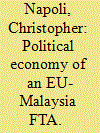| Srl | Item |
| 1 |
ID:
135317


|
|
|
|
|
| Summary/Abstract |
This paper evaluates the debate over whether China’s emergence as an economic superpower has been a complement or threat to ASEAN by examining data in the eleven years following China’s accession to the WTO. Employing a qualitative approach, it seeks to understand whether China’s growing dominance has hindered ASEAN GDP growth, exports and attractiveness as a destination for FDI. The evidence suggests that China’s rise has caused a shift in global trade patterns, with China dominating Western markets at the expense of ASEAN countries. Despite this, China’s dominance does not appear to have had a significant negative effect on growth rates for ASEAN GDP, exports, or FDI stocks. Given this, the paper concludes that while China is crowding ASEAN out of Western markets, increased Chinese demand for ASEAN imports has more than offset this effect. The result is that ASEAN exports and GDP have grown despite shifting trade patterns in the short run.
|
|
|
|
|
|
|
|
|
|
|
|
|
|
|
|
| 2 |
ID:
121867


|
|
|
|
|
| Publication |
2013.
|
| Summary/Abstract |
In September 2010, the European Union (EU) and Malaysia began negotiating a free trade agreement (FTA). This paper examines the prospects and challenges facing the EU-Malaysia FTA negotiations from a political economy perspective. It will argue two points. First, while a deep FTA would offer significant welfare gains to Malaysia, a deep agreement is unlikely to be negotiated. This is because of the difficulty Malaysia would have in opening its services markets and changing investment regulations. Second, even a deep FTA would be of little economic or strategic use for the EU. Both points beg the question: why bother negotiating an FTA?
|
|
|
|
|
|
|
|
|
|
|
|
|
|
|
|